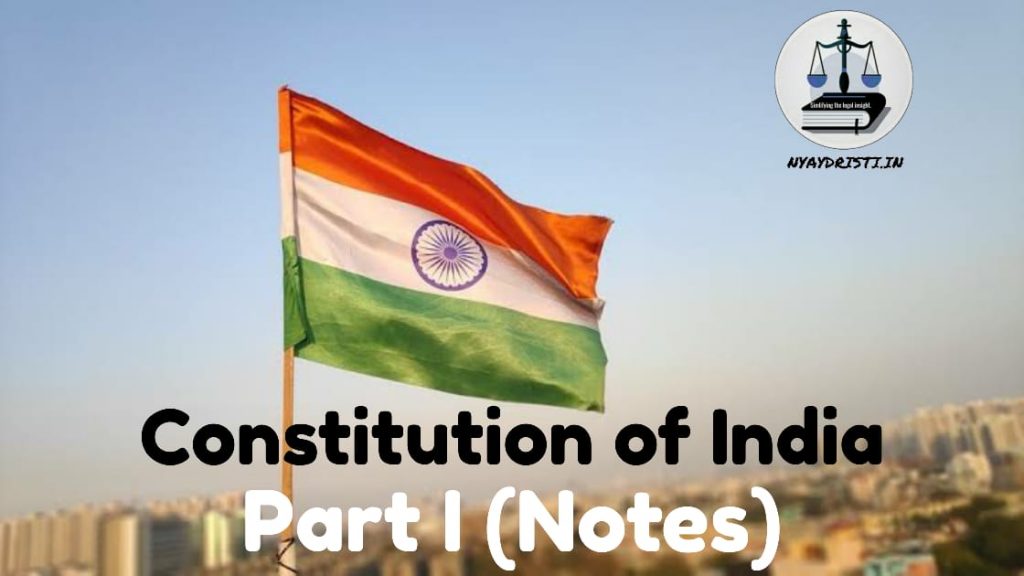Part-1
Union and Its Territory {Article-1 to 4}
Article 1– Name and territory of the Union
(1) India, that is Bharat, shall be a union of states
In constitution Assembly there was a debate over the name of country that it should be India or Bharat after this debate the Constitutional assembly decided to put the both name as India, that is Bharat. Union of States tell us about the polity of India that India is made up of states and states are the unites of India. In which state government have no power to change area boundaries of states but central government have power to change the area boundary of states.
(2) The States and the territories thereof shall be specified in the first schedule.
All the states and territories of India must be mentioned in the first schedule. If parliament add any area to first schedule then that area will be part of India and comes under Union of states.
(3) The territory of India shall comprise
-territories of the states
-union territories
-territories that may be acquired by the government of India at any time.
Territory is said to be acquired when the Indian Union acquires sovereignty over such territory.
Examples of acquisition in India after independence are: Sikkim, Goa, Daman and Diu, Dadra and Nagar Haveli and Pondicherry
Article 2– Admission or Establishment of New States
Parliament may by law admit into the union, or establish, new states on such terms and conditions as it thinks fit.
Here new states are those states which were not the part of India.
-This Article provides for two powers to the Parliament:
-The power to admit into the Union new States
-the power to establish new States
-The admission or establishment of new State will be on such terms and conditions as Parliament thinks fit.
-Such States cannot claim equal position like already existing States in the country.
Admission means those state which were already formed and then it becomes part of Indian the territory acquired from other country by war or agreement and establishment means those state which were not formed earlier.
Example of admission- Nepal is a country which is well formed and if it became part of India then it will be called admission.
Example of establishment- If India capture any part of Pakistan in war then it is called establishment.
Article 3– Formation of new state and alteration of areas, boundaries or names of existing states:
Parliament may by law-
(a) form a new state by separation of territory from any state or by uniting two or more states or parts of states or by uniting any territory to a part of any state;
(b) increase the area of any state
(c) diminish the area of any state
(d) alter the boundaries of any state
(e) alter the name of any state
Example-
Formation of new state by separation of territory- Gujrat becomes a new state after separation from Bombay.
Uniting two state- means if we unite Bihar and Utter Pradesh and the new state is formed.
Alter the name of state- the change in name of states such as-
-Travancore-cochin to Kerala (1956)
-Madhya Bharat to Madhya Pradesh (1959)
-Madras State to Tamil Nadu (1969)
-Mysore State to Karnataka (1973)
-Uttaranchal to Uttarakhand (2007)
-Orissa to Odisha (2011)
A bill can be introduced by parliament only with the prior recommendation of the President. Before recommending the bill, the President has to refer the same to the state legislature concerned for expressing his views within specified period. The Parliament is not bound by the views of state legislature and may either accept or reject them, even if the views are received at time. Therefore, India is described as an indestructible union of destructible states.
Few legislations under Article-3 are-
-State of Nagaland Act, 1962
-Punjab Reorganisation Act, 1966
-State of Himachal Pradesh Act, 1970
-Bihar Reorganisation Act, 2000
-Uttar Pradesh Reorganisation Act, 2000
-Madhya Pradesh Reorganisation Act, 2000
Article 4– Laws made under articles 2 and 3 to provide for the amendment of the First and the Fourth Schedules and supplemental, Incidental and consequential matters.
This means that the law made under Article 2 and Article 3 are not to be considered as amendments of the constitution under Article 368. It means such laws passed by simple majority and by the ordinary legislative process.
Vaibhav sanchar
Central University of South Bihar

